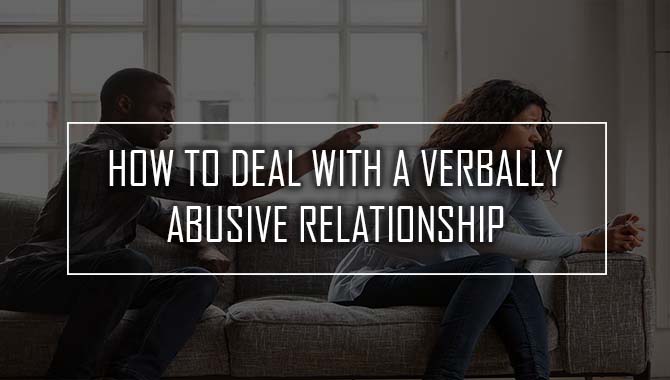If you’re in a relationship where verbal abuse is a regular occurrence, it can feel like everything is constantly falling apart. But there is help available – you just need to know where to turn.
This blog outlines the signs of a verbally abusive relationship and some tips on how to deal with it. Whether you’re the one abused or the one who’s trying to get out of the relationship, read on for advice that will help you get through this difficult time.

What Is Verbal Abuse?

Verbal abuse is any harmful or offensive communication, often directed at an individual. So, what qualifies as verbal abuse? It can include calling someone names, making threats, and insulting them. If you’re feeling unsafe or threatened in your relationship, it’s time to get out! It’s important to understand what qualifies as verbal abuse to protect yourself from it.
If you ever feel that you’re in danger or that your verbal abuse is getting out of hand, it’s important to speak up. Your partner may not realize how much their words hurt you, and it’s up to you to end the abuse.
The Signs Of A Verbally Abusive Relationship

If you’re in a verbally abusive relationship, it can be difficult to tell whether or not it’s abusive. That’s why it’s important to be aware of the signs of an abusive relationship. These signs include emotional abuse, humiliation, name-calling, and physical abuse.
If you feel like you’re in a bad situation, taking action is important. Many resources are available to help you leave an abusive relationship, and it’s worth the effort. Remember: if you or someone you know is in an abusive relationship, help is available. Don’t suffer in silence – speak up and get the help you need to break free.
Name-Calling
Name-calling is the act of calling your partner names, often in a derogatory way. This type of communication destroys trust and can lead to emotional abuse. People who call their partners names often do so because they feel frustrated and angry with them.
They wrongly believe that this form of verbal abuse will make the other person react in a certain way to resolve the issue. Name-calling only serves to deepen negative emotions and undermine relationships further.
Interrupting someone’s sentences also has the same goal – it denies them an opportunity to express themselves fully and makes them feel unheard (especially if it’s their first time being interrupted). Threats or revengefulness also show that the abuser isn’t afraid of violence or knows how to exploit their victim effectively enough for personal gain.
Condescension
When someone is condescending, they believe they are superior and show it by talking down to you. They may refer to you as ‘crazy’ or ‘stupid’, making sure that their insults hit home. This type of person also uses sarcasm and other verbal techniques to undermine your confidence, so you will not be able to argue or defend yourself effectively.
Ultimately, this makes it difficult for both of you – the con descender gets what they want, while the target feels humiliated and drained of energy.
Manipulation
If you’re in a relationship where manipulation is a common pattern, it can be tough to break free. It’s hard when your partner constantly criticizes and puts you down while making all the decisions. You feel like you can’t escape – they always seem to know what to say exactly or do to get their way.
And worst of all, even if you try to stand up for yourself, you often feel like you’re mistaken or inadequate. These four psychological manipulations keep victims trapped in abusive relationships for years.
Criticism
There are some negative behavior patterns common among critics. Some of the most common include:
– Constant putdowns – Critics delight in tearing down other people’s work or opinions, often without any constructive input or argument.
– Making you feel inferior
– They tend to make others feel like they’re not good enough and unworthy of attention. This can create a lot of emotional stress and even contribute to job insecurity.
– Saying hurtful things behind your back
– Critics often take the opportunity to criticize someone privately, leaving them feeling humiliated and upset.
– Control freak behavior – Critics try too hard to control every aspect of their partner’s life, leading to resentment. Eventually, this type of relationship becomes unbearable for either party involved
Demeaning Comments
Abusive relationships are marked by emotional, physical, and mental verbal abuse. These comments make the victim feel small, stupid, or inferior- all of which can seriously impact their emotional health and well-being.
The abuser tries to control the victim through abusive comments- making them believe they need to stay in the relationship to “prove” themselves to them. It’s important not only to get out of this type of relationship but also to speak up about it. You should not tolerate any form of abuse.
Threats
When it comes to verbal abuse, the abuser will use threats to control their partner. These threats can take many forms- verbal, emotional, and even physical. In some cases, they may make direct threats of violence or harm to the victim themselves or someone close to them.
Victims may be afraid to leave or speak out for fear of further hurt- creating an unsafe environment that is hard to escape. If you are in a verbally abusive relationship, you must get help ASAP! By doing so, you will feel more supported, and your safety concerns might finally be taken seriously by those around you who may have been complacent about the situation thus far.
Blame
It is common for people in abusive relationships to take all the blame. This way of thinking results in abuse victims feeling wronged and helpless constantly, leading to more frustration and anger.
Abusers’ verbal putdowns are often meant as insults rather than correcting an inaccurate assumption or criticism, making them even more hurtful. Abusers tend to use sarcasm and verbal putdowns to control their partners by demonstrating that they have power over them.
If you find yourself in such a relationship, it is important not to stay silent – get help from friends or family members who care about you before it becomes too late!
Accusations
If you are experiencing accusations from your partner, it is important to take notice and act fast. Accusations can be one of the earliest signs that a relationship is in trouble. Here are some other things to keep in mind when dealing with accusations:
– They will try to make you feel guilty and like you are responsible for everything that goes wrong.
– They may refuse to listen to your explanations or views.
– If this behavior continues, it might be time for you to break up with them before it worsens.
Withholding
Withholding is one of the most abusive behaviors a partner can do to another. It takes away your freedom, restricts your social life, and makes you feel like a prisoner in your own home. Verbally abusive relationships are built on the principle of withholding.
One partner continuously denies or diminishes the other’s needs and feelings. They may do this by refusing to talk to or listen to their partner, blaming them for everything that goes wrong, or making them feel like they’re nothing.
Gaslighting
Gaslighting is a form of mental abuse in which one person systematically tries to convince another person that they are insane or have lost their mind. You can do this by repeating false allegations, making the victim feel like they’re always wrong and responsible for everything that goes wrong in the relationship, and denying anything wrong, even when it’s blatantly obvious.
Sometimes gaslighting abusers will use violence or other forms of intimidation to control their victim.
Circular Arguments
Arguments happen circularly – one person says something, the other reacts defensively, and so on. This usually leads to conflict and emotional distress for both parties. Unfortunately, it is difficult to break free from this negative cycle – often, it’s hard to realize that we are actually in an abusive relationship until it has become too much. If you find yourself caught up in verbal abuse, there are a few things you can do:
first of all, get help from friends or family members who will be supportive; secondly, try avoiding the abuser by staying away from them; third, avoid any physical violence as this could lead to more serious consequences. If everything else fails and violence becomes unavoidable- remember that seeking professional assistance is always the best course of action.
6 Ways To Deal With Verbal Abuse In Your Relationship

Verbal abuse can have a devastating impact on both the abuser and the abused. It can be incredibly difficult to deal with, but there are ways to cope. If you’re feeling unsafe or threatened, it’s important to speak up. Choose your words carefully, and try to stay calm—practice self-care by allowing yourself time away from the abusive person to relax and recharge your batteries.
If you cannot leave the relationship for any reason, seek out external resources such as a domestic violence hotline or support group. Remember that abuse is never the victim’s fault and is unacceptable. Speak up, get help, and stay safe.
1. Walking Away

If you are in a verbally abusive relationship, the best thing to do is to walk away. This may sound sudden and hard but it is actually the safest option for both of you. It’s never okay to be verbal abuse – no matter who is doing it. Stand up for yourself and be assertive. Tell your abuser that their behavior isn’t acceptable and that you will no longer put up with it.
Don’t take it anymore – get out before things get worse than they already are. Talk to someone about what’s going on so that they can help guide you through this difficult time; a friend, family member, or counselor might be the support you need at this point in your life. Remember that there is always hope – abuse doesn’t have to last forever.
2. Taking The High Road
It can be difficult to know what to do if you’re in a verbally abusive relationship. Situations go tough when things go wrong in a relationship – especially if the other person doesn’t seem to understand or care. However, some simple steps can help you healthily get through this difficult time.
- Don’t retaliate or become angry- such behavior only worsens the situation and further distances you from each other.
- Keep your cool- emotional outbursts won’t solve anything and might even worsen matters.
Instead, try to remain calm and levelheaded during these trying times. This will help reduce tensions and allow for more constructive communication between you two (or more).
3. If things continue getting worse, it’s important to seek professional help- somebody who is unbiased yet experienced with relationships could be of great assistance during this time of turmoil。
4. Ultimately, it’s up to you whether or not you stay in the relationship; but remember that taking the high road always leads us down smoother paths in life。
3. Being Clear With Yourself About Your Boundaries
It is important to be clear about your boundaries and stick to them. If the abuse gets too much, it is time to end the relationship for good. Don’t let the abuser control your emotions or emotional state – keep yourself calm and collected. If necessary, take steps to protect yourself from further abuse by getting a restraining order.
4. Protecting Your Self-Worth

It is crucial for any abuse survivor to remember that they are not the only one who is hurting. In a relationship where physical and emotional violence is occurring, it can be hard to see or verbalize the signs of abuse.
However, suppose you’re noticing your self-worth diminishing, trying to avoid specific situations or people, feeling like you have no control over your life, or being scared all the time. In that case, these could be some early signs of abuse. Once you understand what’s happening and take action based on this knowledge, things will slowly start improving.
You might need emotional support along the way and outside advice to make sure that you leave safely and without jeopardizing your safety further down the line. Talking openly about abusive relationships can be very intimidating, especially when done alone, but voices must be raised so that more victims feel empowered enough to reach out for help- which ultimately saves lives
5. Harnessing Empathy

Abusers are not thinking logically. This is why it is important to remember that when talking to them. Do not take their words at face value, but try and see things from their perspective.
Use compassionate language when communicating with them, and stay calm even if the abuser becomes verbal or emotional in response. If abuse is a regular occurrence, seek help from friends or family members who can provide moral support and assistance in dealing with the situation calmly and compassionately.
6. Re-Centering
Relationships can be challenging thing. They can be exciting and full of passion, or they can be abusive and emotionally draining. The key to a healthy relationship is for both parties to feel appreciated and understood.
If things are getting out of hand, it’s important to take some time for yourself so that you can regain your emotional equilibrium. This might mean taking some time away from the other person or retreating into silence altogether.
It is also crucial to keep a diary in which you document all the negative experiences so that you have something to reflect on later – with hope! In the worst-case scenario, where things continue deteriorating rapidly, seeking professional help may be necessary. However, keep relationships from defining who you are; there is always the potential for growth if both people try it.
Do’s And Don’ts Of Dealing With Verbal Abuse.

Verbal abuse is one of the most damaging things that can happen to someone. It can leave physical and emotional scars that last long after the abuser has left. If you are in a verbally abusive relationship, it is important to stay calm and keep your head up amid all the chaos. Do not retaliate – this will only make things worse for you.
Instead, try and get away from the abuser as quickly as possible; doing so may be your best chance of survival. Listening to yourself first is another essential step in avoiding verbal abuse – if you don’t feel safe or respected, chances are high that you will lash out at your abuser too.
In such cases, it’s crucial to seek help from friends and family members who care about you- they’ll be able to provide sound support during these difficult times.
What To Do If Verbal Abuse Doesn’t Stop

Verbal abuse can be a really tough thing to deal with. It can leave you feeling helpless, stressed, and completely alone. However, there are ways to get through it. If verbal abuse doesn’t stop after trying other methods, it might be time to get help from a professional.
Professionals can provide emotional support, help you to identify the abusive behavior and provide resources to help you cope.
Remember that you’re not alone, and there are people who care about you. If you need to speak out about the abuse, try to do it in a way that won’t put the abuser in danger. Lastly, take action by filing for a restraining order or speaking to authorities about the abuse. Doing so will help to put a stop to the abuse and protect you from further harm.
Conclusion
Verbal abuse is a type of abuse that is characterized by frequent and unjustified verbal attacks on the victim. If you are in a verbally abusive relationship, it is important to know the signs and symptoms of this type of abuse. Additionally, it is essential to know what to do if verbal abuse doesn’t stop.
Seek help from a trusted friend or family member, or contact a domestic violence hotline for advice and support. Thank you for reading, and we hope that this blog has provided you with the knowledge you need to deal with a verbally abusive relationship.
Frequently Asked Questions
1. What Are The Five Signs Of Emotional Abuse?
Ans: The five signs of emotional abuse are as follows:
1. Constant berating, name-calling, and other negative comments
2. They are withholding or withdrawing love and support
3. Making you feel like a worthless person,
4. Controlling your movements and behaviors
5. Losing control over your emotions
2. What Counts As Verbal Abuse?
Ans: Verbal abuse can be anything from psychological to physical abuse. It is often called emotional abuse because it involves emotional manipulation and verbal attacks. Abusers will call their partner names, insult them, or accuse them of being bad motives. This type of abuse usually occurs when one partner feels backed into a corner and has no other way out.
3. What Makes Someone Verbally Abusive?
Ans: Abusive relationships often involve a number of negative behaviors, such as name-calling, constantly putting the other person down, yelling and screaming at each other, and leaving threats or insults behind. People who are abusive have an inflated view of their own self-worth, which usually leads them to believe they are superior to their partner.
4. What Mental Illness Is Caused By Verbal Abuse?
Ans: Verbal abuse can cause mental illnesses such as post-traumatic stress disorder (PTSD). PTSD is a mental health condition that results from exposure to an event that is traumatic and life-threatening. It is often accompanied by flashbacks, nightmares, and an intense fear of the abuser. Abuse victims often also develop depression and anxiety as a result of their experiences.
5. What Makes Someone Verbally Abusive?
Ans: Verbally abusive people use words to hurt, control, and intimidate their victims. They often resort to name-calling, putdowns, false accusations, and insults in an effort to hurt and control their victims. Abusive relationships can be destructive not just for the abuser but also for the victim’s mental health and well-being.

Leave a Reply